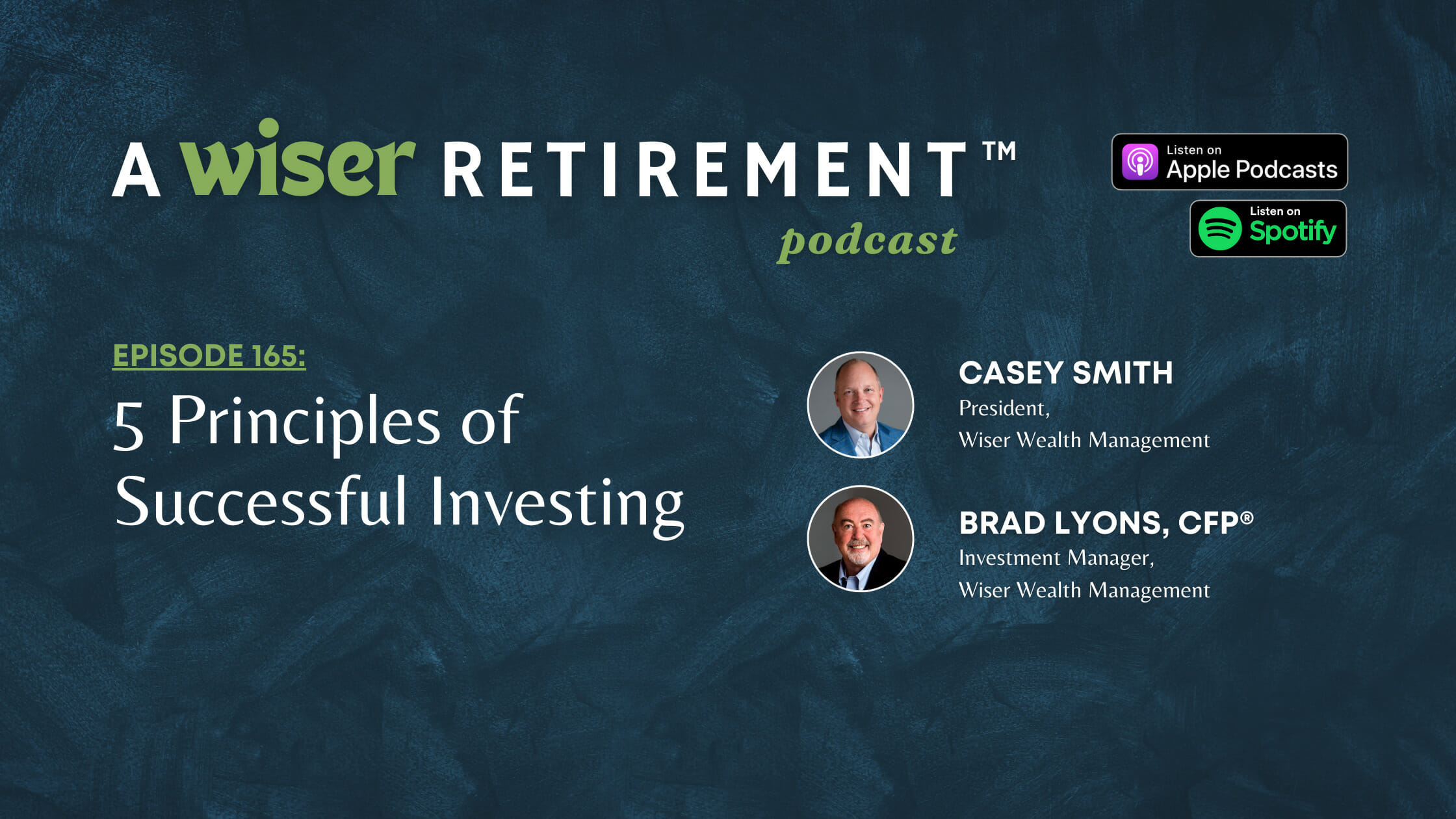
5 Principles of Successful Investing
On this episode of A Wiser Retirement™ Podcast, Casey Smith and Brad Lyons, CFP® discuss 5 principles of successful investing. These principles should help you succeed in any season of life and through differing economic and political circumstances.
Listen on Apple Podcasts or watch on YouTube:
SUMMARY:
As we approach another election cycle, it is important to remind ourselves of 5 principles of successful investing. It can be easy to get caught up in political party agendas and let that affect our investment strategies. As both parties are now voting to determine who their presidential candidate will be, we are already looking at statistics to try to understand who has a better chance of winning the 2024 election, considering the country’s economic and social situation at the moment.
There is a very interesting podcast interview by the All in Podcast, with Robert Kennedy Jr., where he touches on historical facts about elections. As elections start making headlines with more frequency over the next few months, we like to remind our clients that there will always be things outside of our control, and this is one of them. We have to focus on what we do have control over, and make the best out of our circumstances. With this in mind, here are 5 principles of successful investing.
1. Set Investment Goals
Just throwing money into something with the sole purpose of making more money is much like going through life aimlessly. You should always ask yourself what you want the money to do for you, and then we figure out how to invest and what to invest in. Therefore, once you have clear goals set, then you can start developing a plan to reach them.
2. Understand Your Risk Tolerance
A risk tolerance questionnaire can help you determine what your risk tolerance level is. This is an important conversation to have with your financial advisor, so they know exactly where you stand. It is also important to understand the magnitude of the stock market oscillations, which can be for gain or loss. The higher the yield, the bigger the risk. This is really a personal decision, as some can understand the stock market variations better than others. Historically, we know that the stock market has always gone up after a bad period.
The role of an advisor is to guide people through the bad times and help them stay invested for the long-term and be able to reap the benefits of their investments. Vanguard published a report a while back that stated that having an advisor is beneficial to a portfolio by 3%. In other words, people who use a financial advisor with their investments have 3% more return than others who choose to “DIY“.
3. Diversify Your Portfolio
Diversifying your portfolio, doesn’t mean diversifying who holds your money. Ultimately, diversification means your portfolio should include a variety of investments such as large cap stocks, big cap, small cap, foreign stocks, and bonds (inside bonds there are different maturity periods).
4. Invest for the Long-Term
As a firm, we’ve seen the ups and downs of the stock market and have been able to note that chaotic times don’t have a permanent effect on investments, it’s always a temporary effect. Losses occur based on how investors react to the rough times, and not really the specific time period. We’ve seen some really tough times for the financial sector in our country. However bad those were, when we look at the charts now, we see that they are nothing but a blip. After the difficult times we have always been able to recover and do even better than before.
Unfortunately, the problem with investing in the stock market is created by human nature. It is in our nature to think that whatever we are going through today will remain forever. This is not true for most aspects of life, especially including investing.
5. Rebalance Your Portfolio Regularly
This step is difficult for “DIY” investors, because it’d require a lot of excel knowledge and time to spend on it. Rebalancing means selling high and buying low. This goes back to diversification and risk tolerance. It’s crucial to understand what you are doing to make sure this process is profitable to your portfolio.
Download our eBook on “Buyer Beware: Why do they keep trying to sell you that annuity?”
TIMESTAMPS:
0:00 Intro
14:20 Set Investment Goals
19:56 Understand Your Risk Tolerance
24:35 Diversify Your Portfolio
30:38 Invest for the Long-Term
39:00 Rebalance Your Portfolio Regularly
LINKS:
Learn more about Casey Smith and Brad Lyons, CFP®
CONNECT:
Twitter, Instagram, Facebook, LinkedIn, and YouTube.
Learn more about A Wiser Retirement™ podcast and access previous episodes.
Share This Story, Choose Your Platform!
Wiser Wealth Management, Inc (“Wiser Wealth”) is a registered investment adviser with the U.S. Securities and Exchange Commission (SEC). As a registered investment adviser, Wiser Wealth and its employees are subject to various rules, filings, and requirements. You can visit the SEC’s website here to obtain further information on our firm or investment adviser’s registration.
Wiser Wealth’s website provides general information regarding our business along with access to additional investment related information, various financial calculators, and external / third party links. Material presented on this website is believed to be from reliable sources and is meant for informational purposes only. Wiser Wealth does not endorse or accept responsibility for the content of any third-party website and is not affiliated with any third-party website or social media page. Wiser Wealth does not expressly or implicitly adopt or endorse any of the expressions, opinions or content posted by third party websites or on social media pages. While Wiser Wealth uses reasonable efforts to obtain information from sources it believes to be reliable, we make no representation that the information or opinions contained in our publications are accurate, reliable, or complete.
To the extent that you utilize any financial calculators or links in our website, you acknowledge and understand that the information provided to you should not be construed as personal investment advice from Wiser Wealth or any of its investment professionals. Advice provided by Wiser Wealth is given only within the context of our contractual agreement with the client. Wiser Wealth does not offer legal, accounting or tax advice. Consult your own attorney, accountant, and other professionals for these services.





